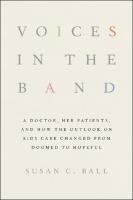Voices in the Band
A Doctor, Her Patients, and How the Outlook on AIDS Care Changed from Doomed to Hopeful
Author(s)
Ball, Susan C.
Language
EnglishAbstract
"I am an AIDS doctor. When I began that work in 1992, we knew what caused AIDS, how it spread, and how to avoid getting it, but we didn't know how to treat it or how to prevent our patients' seemingly inevitable progression toward death. The stigma that surrounded AIDS patients from the very beginning of the epidemic in the early 1980s continued to be harsh and isolating. People looked askance at me: What was it like to work in that kind of environment with those kinds of people? My patients are 'those kinds of people.' They are an array and a combination of brave, depraved, strong, entitled, admirable, self-centered, amazing, strange, funny, daring, gifted, exasperating, wonderful, and sad. And more. At my clinic most of the patients are indigent and few have had an education beyond high school, if that. Many are gay men and many of the patients use or have used drugs. They all have HIV, and in the early days far too many of them died. Every day they brought us the stories of their lives. We listened to them and we took care of them as best we could."—from the Introduction In 1992, Dr. Susan C. Ball began her medical career taking care of patients with HIV in the Center for Special Studies, a designated AIDS care center at a large academic medical center in New York City. Her unsentimental but moving memoir of her experiences bridges two distinct periods in the history of the epidemic: the terrifying early years in which a diagnosis was a death sentence and ignorance too often eclipsed compassion, and the introduction of antiviral therapies that transformed AIDS into a chronic, though potentially manageable, disease. Voices in the Band also provides a new perspective on how we understand disease and its treatment within the context of teamwork among medical personnel, government agencies and other sources of support, and patients. Deftly bringing back both the fear and confusion that surrounded the disease in the early 1990s and the guarded hope that emerged at the end of the decade, Dr. Ball effectively portrays the grief and isolation felt by both the patients and those who cared for them using a sharp eye for detail and sensitivity to each patient's story. She also recounts the friendships, humor, and camaraderie that she and her colleagues shared working together to provide the best care possible, despite repeated frustrations and setbacks. As Dr. Ball and the team at CSS struggled to care for an underserved population even after game-changing medication was available, it became clear to them that medicine alone could not ensure a transition from illness to health when patients were suffering from terrible circumstances as well as a terrible disease.
Keywords
HIV/AIDS; MemoirsDOI
10.7298/0h3c-1x58ISBN
9780801455421, 9780801453625, 9780801455414, 9780801455421, 9780801455414Publisher
Cornell University PressPublisher website
https://www.cornellpress.cornell.edu/Publication date and place
Ithaca, 2015Imprint
ILR PressClassification
Health, illness and addiction: social aspects


 Download
Download Download
Download Web Shop
Web Shop